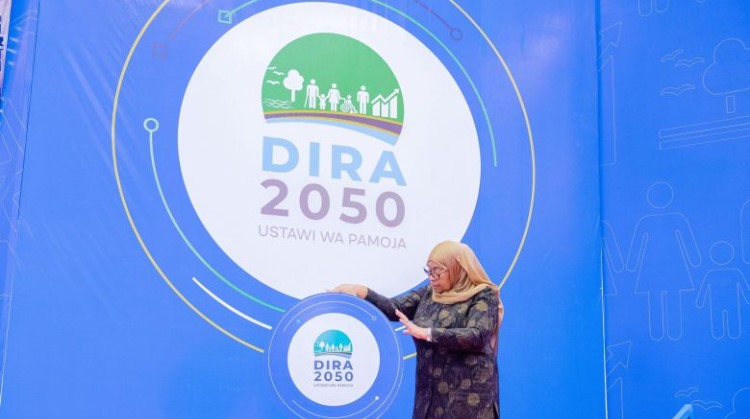Clarity and knowledge are key to 2050 ambition

EVERY time I delve into the National Vision 2050, I pause in thought. Its ambition is striking: To transform Tanzania into an upper-middleincome economy, achieving a national income of one trillion US dollars and a per capita income of 7,000 US dollars by 2050. But ambition alone is not enough.
Clarity of knowledge is just as crucial as financial targets. Unclear or incomplete information can be as risky as misinformation especially when it concerns human capital, the foundation of any sustainable growth strategy.
Public discussions about education increasingly focus on the information revolution and technology preparedness. Students today are often considered luckier than ever, with instant access to books, articles, lectures, reference materials and ideas from across the globe.
This view holds some truth, yet it raises critical questions. From my more than twenty years in academia, I can attest that while information is abundant and accessible, having it does not automatically translate into understanding.
My five-year research on clarity in university education in Tanzania, involving 450 students, found that many struggle to articulate concepts in their own words or connect theories across fields.
Smartphones and search engines aid research, but they cannot replace comprehension or the ability to critically process information. The challenge lies less in data availability than in its analysis and interpretation.
People are often torn between facts and opinions, unable to distinguish evidence from speculation. As a result, real knowledge risks being buried under the flood of information generated by the information revolution.
Unclear information can be as misleading as false information; misinformation can be weaponised through poorly understood scientific theories or misquoted historical facts.
Clear explanations, however, transform facts into understanding, enabling critical and responsible thinking. Our educational framework has struggled to evolve to meet contemporary needs. Universities, both public and private, despite dedicated faculty and talented students, remain hindered by outdated assessment methods. Rote learning continues to dominate over reflective thinking.
ALSO READ: Market rotations expose fragile momentum
Examinations primarily assess recall rather than the ability to articulate or apply knowledge. In an age demanding synthesis and depth, we are still clinging to a model suited for scarcity, not abundance.
I previously met with the Minister for Education, Science and Technology, Prof Adolf Mkenda, with whom I have maintained a relationship since 1991.
I emphasised that the role of educators must evolve. Education can no longer be limited to transmitting information; it must foster understanding aligned with the goals of DV2050. Students emerging from our institutions are expected to become key contributors across its sectors, each assuming distinct responsibilities.
This requires guiding students to analyse sources critically, compare perspectives and evaluate assumptions. Dialogue, debate and curiosity must replace silence and rote learning. Individual teachers cannot bear this responsibility alone; institutional reform is essential. Universities must cultivate a culture of clarity by reforming assessment systems and academic structures.
Evaluation tools should measure comprehension rather than memorisation, through openended questions, project-based assessments and inquiry-driven assignments. Teachers need guidance and resources to foster critical thinking.
Achieving clarity is essential for realising the one trillion US dollars economy, yet tradition will hinder progress unless the system is restructured holistically. Clarity is also a moral imperative.
It requires humility and recognition that knowledge is provisional. In cultures where absolute certainty is equated with power, humility sets an example for children, teaching that learning is about refining thinking rather than having all the answers.
Clarity is a civic requirement. In an environment where misinformation and polarisation flourish, citizens unable to think critically are susceptible to manipulation, particularly as we approach the national General Election on October 29, 2025. Clear understanding enables individuals to look beyond noise, challenge falsehoods and contribute meaningfully to collective progress.
Educational institutions play a vital role in producing not only employable graduates but also thoughtful, engaged citizens.
Vague information undermines strategic alignment, whether for individuals or the nation. A shift to a knowledgebased, innovation-led economy requires coordinated efforts across education, skills development, health, entrepreneurship and governance.
Lack of clarity can cause misunderstandings among policymakers, misallocation of resources, or overemphasis on university degrees at the expense of vocational skills. Private sector investment in training and job creation also suffers when future needs are unclear. Citizens lacking accurate information cannot engage effectively.
For Vision 2050 to succeed, Tanzanians must understand the implications of a one-trillion US dollars economy, their contributions and the skills and behaviours required to excel.
Without clarity, young people may pursue academic paths misaligned with market needs, communities may resist reforms such as land digitalisation or industrial zoning due to uncertainty and entrepreneurs may remain in the informal sector because of unclear incentives. Decisions informed by clarity require precise data collection and analysis.
Advancing human capital depends on reviewing labour market data, educational outcomes, health metrics and productivity trends. Without accurate data and its proper application—as emphasised during the 4th Tanzania Monitoring, Evaluation and Learning (MEL) Conference 2025 in Mwanza, where Prime Minister Kassim Majaliwa was guest of honour—poor data collection, misunderstanding, or inadequate monitoring can lead to decisions with serious social, political and economic repercussions. In short, clarity of knowledge underpins every step toward a one-trillion US dollars economy.
Information alone is not enough; we must ensure that understanding, critical thinking and well-informed decisions guide the nation toward its Vision 2050 goals. By fostering clarity at every level—from classrooms to government offices, the country can turn ambition into reality, equipping its citizens to meet the challenges of a rapidly changing world.


